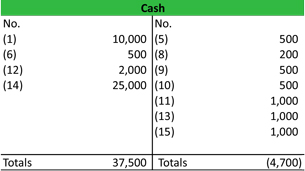
They play a greater role in reviewing what products or services a company needs, as well as how these efforts can be financed. For example, if my business earned $50,000 in revenue over a quarter but had $30,000 in expenses, my income statement would show a net profit of $20,000. This document is essential for understanding my company’s financial performance and making decisions about future operations.

Get QuickBooks
- Additionally, a certified public accountant (CPA) is an accountant who has passed the CPA exam and has met state licensing requirements.
- Ideally, you should complete your bookkeeping every month so you can keep a thumb on the pulse of your income, expenses, and overall business performance.
- Transactional accounting is the process of recording the money coming in and going out of a business—its transactions.
- While you’re at it, you’ll be able to identify trouble spots and make adjustments to improve your business.
One of the primary services accountants offer is the preparation of a client’s annual financial statements to display their performance over the year. Typically, this includes an income statement, balance sheet, and cash flow statement. Welcome to your weekly accounting tasks, otherwise known as the land of invoicing, financial data management, and other business bank account long-term liabilities examples with detailed explanation fun.
This way, you catch any mistakes early and allow payroll to get processed on time. Building these weekly accounting tasks into your routine keeps you proactive with your client work as well as efficient and organized. At the end of each day, reconcile all cash payments and payment receipts received in the general ledger to get a good idea of each client’s cash balance.
There are, of course, various types of accountant jobs and areas of specialty. Putting together your financial statements and reviewing them allows you to evaluate how much money you’re making—the difference between revenues and expenses—and how you spend profits. While you’re at it, you’ll be able to identify trouble spots and make adjustments to improve your business. Business accounting is the process of gathering and analyzing financial information on business activity, recording transactions, and producing financial statements. In this article, you’ll find a free set of templates to help you get started. Plus, we review a few daily, weekly, monthly, quarterly, and annual accounting tasks successful firm owners keep tabs on to prevent their teams from getting overwhelmed.
accounting practices your business should be doing to succeed
Those accountants interested in becoming a CPA must earn at least a bachelor’s degree and pass a state licensure exam. Yes, you’ll need to determine how you want to manage your books, such as the do-it-yourself route, such as Excel spreadsheets, or use accounting software like QuickBooks. Alternatively, you can outsource your bookkeeping or hire a part-time bookkeeper. This can be as simple as a statement showing your current cash position, expected upcoming cash receipts, and expected cash payments for this period. You’ll want to gather and record all your transactions, usually weekly, but you can do this daily or bi-weekly, depending on your volume. This includes recording revenue such as product sales and expenses like purchasing supplies.
Reconcile Cash and Receipts
Daily cash reconciliations create a paper trail and work cashing old checks as a control for the business. You can immediately tell if cash is missing and only need to investigate the past 24 hours if anything is off. As your firm grows, having an organized workflow for the many client tasks you manage is vital. Without one, it’s easy to get stuck doing time-consuming work because you lack an efficient system. While math skills are helpful, data and systems analysis are keys to success in this role.
Additional certifications are also preferred in many cases; holding these credentials can help improve a job seeker’s prospects. Accounting is a broad term that encompasses multiple different job titles and roles within organizations. There are three main types of accountants—public accountants, management accountants, and government accountants—all of which focus on different aspects of the profession. They are legally and ethically responsible to be honest and trustworthy and must avoid negligence in their duties. CPAs have real influence over their clients, which means their judgment and work can affect not just an individual but an entire company—including its employees, its board, and its investors. For more information, read our recent blog on exploring the future of tax automation to elevate firm efficiency.
But easy-to-use tools can help you manage your small business’s internal accounting cycle to set you up for success so you can continue to do what you love. As a small business owner, it’s essential to have a clear picture of your company’s financial health. Transactional accounting is the process of recording the money coming in and going out of a business—its transactions. However, there are other career options worth considering beyond a Certified Public Accountant.
Thankfully, Square and PayPal make it easy to accept card payments using your smartphone or tablet. These programs also send your customers’ receipts, reconcile your transactions, and handle returns if necessary. The only thing it doesn’t show is cash flow — a business can look profitable but have zero dollars in the bank. If a business’s annual revenue exceeds $5 million, it’s required to use the accrual method. Not only will this help offset some upfront expenses, but it will also contribute to your business’s overall credit.
They are current ratio formula the ones tracking, analyzing, and auditing the company’s income and expenditures. They also have a key role in planning, decision-making, and forecasting, based on their ability to accurately estimate the cost of future projects. They can also be held liable under statutory law by state or federal securities regulatory bodies.